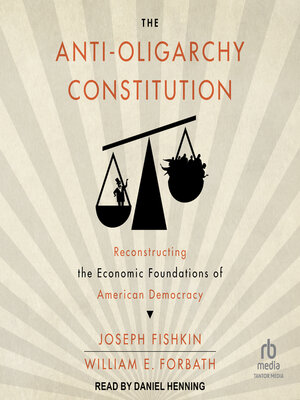The Anti-Oligarchy Constitution
audiobook (Unabridged) ∣ Reconstructing the Economic Foundations of American Democracy
By Joseph Fishkin

Sign up to save your library
With an OverDrive account, you can save your favorite libraries for at-a-glance information about availability. Find out more about OverDrive accounts.
Find this title in Libby, the library reading app by OverDrive.



Search for a digital library with this title
Title found at these libraries:
| Library Name | Distance |
|---|---|
| Loading... |
Oligarchy is a threat to the American republic. When too much economic and political power is concentrated in too few hands, we risk losing the "republican form of government" the Constitution requires. But as Joseph Fishkin and William Forbath show in this retelling of constitutional history, a commitment to prevent oligarchy once stood at the center of a robust tradition in American political and constitutional thought.
Fishkin and Forbath demonstrate that reformers, legislators, and even judges working in this "democracy-of-opportunity" tradition understood that the Constitution imposes a duty on legislatures to thwart oligarchy and promote a broad distribution of wealth and political power. During Reconstruction, Radical Republicans argued in this tradition that racial equality required breaking up the oligarchy of the Slave Power and distributing wealth and opportunity to former slaves and their descendants. President Franklin Roosevelt and the New Dealers built their politics around this tradition, winning the fight against the "economic royalists" and "industrial despots."
Today this tradition in progressive American economic and political thought lies dormant. The Anti-Oligarchy Constitution begins the work of recovering it and exploring its profound implications for our deeply unequal society and badly damaged democracy.
Fishkin and Forbath demonstrate that reformers, legislators, and even judges working in this "democracy-of-opportunity" tradition understood that the Constitution imposes a duty on legislatures to thwart oligarchy and promote a broad distribution of wealth and political power. During Reconstruction, Radical Republicans argued in this tradition that racial equality required breaking up the oligarchy of the Slave Power and distributing wealth and opportunity to former slaves and their descendants. President Franklin Roosevelt and the New Dealers built their politics around this tradition, winning the fight against the "economic royalists" and "industrial despots."
Today this tradition in progressive American economic and political thought lies dormant. The Anti-Oligarchy Constitution begins the work of recovering it and exploring its profound implications for our deeply unequal society and badly damaged democracy.







